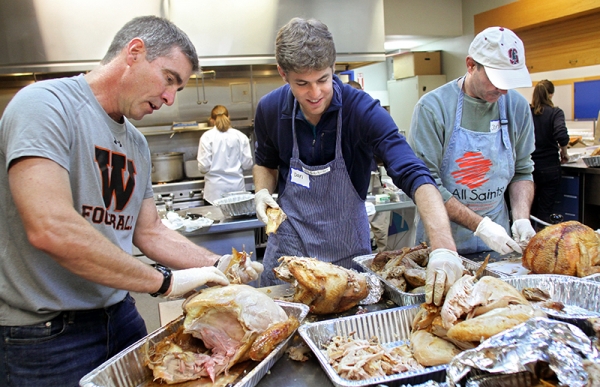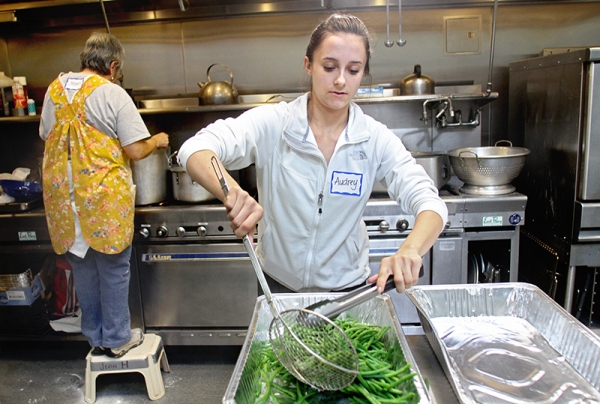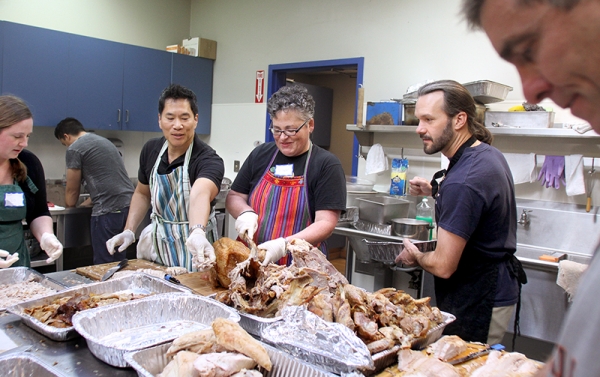Happy holiday,
Happy holiday,
While the merry bells keep ringing
May your every wish come true.
When it comes to the holidays, crooner Bing Crosby summed up the prospects and the pressures aptly. If ever there were a time of year when people expect amped-up happiness, it is the month of mistletoe, parties and gifts galore.
And yet, rather than experiencing the most wonderful time of the year, some people marshal all their energy only to end up feeling harried and spent.
Why does the pursuit of holiday happiness sometimes lead to exactly the opposite?
Recent social-psychology research sheds some light on the phenomenon. It turns out, people often confuse happiness with meaningfulness.
"There's a significant overlap in happiness and meaningfulness. The two constructs are very highly, significantly correlated," said Emily Garbinsky, a doctoral candidate with the Stanford Graduate School of Business, who worked with Roy Baumeister of Florida State University, Kathleen Vohs of the University of Minnesota, and Jennifer Aaker, a marketing professor at Stanford, on a study that was published in the Journal of Positive Psychology.
What the researchers found was that happiness and meaningfulness in life resemble one another but are also distinct. Not understanding the powerful differences between the two can lead people to pursue happiness at the expense of meaning, leaving a gnawing sense of emptiness despite all the festivity and merriment.
To determine the key factors of each, the researchers surveyed nearly 400 adults across the country about their concepts of happiness, meaning and self and how well 36 different activities (shopping, social networking, praying, organizing, etc.) reflected their sense of self. They looked for activities that made people very happy but held little meaning for them and also the reverse activities that were highly meaningful but didn't necessarily make people happy.
They also conducted supplemental research with 124 students, who rated adjectives and phrases as to how strongly those related to meaningfulness and happiness.
"We asked people, 'What do you think of when you think of happiness?'" Garbinsky said. "And we got this robust finding."
One key difference the researchers discovered: Meaningful activities are associated with longer-term thinking and tend to integrate a person's past, present and future.
"Meaning links experiences and events across time, whereas happiness is mostly in the moment and therefore largely independent of other moments," the researchers wrote in the Journal of Positive Psychology article.
"People associate meaning with permanence," explained Garbinsky, who will start as an assistant professor at Notre Dame next summer. "When people have a meaningfulness mindset they think into the future. Meaning has this lasting effect."
By contrast, happiness centers more on having one's needs satisfied and on feeling good more often than feeling bad, researchers found.
The study didn't specifically study holiday-oriented activities. But based on the findings, it's easy to see why traditions by definition, activities that people and their families or friends repeat year after year create meaningfulness during the holidays.
"I agree that traditions would be considered more meaningful because they incorporate the temporal element," Garbinsky said.
Conversely, a season spent hopping from party to party might result in momentary happiness that is quickly forgotten.
Another big difference between happiness and meaningfulness, which should come as no surprise, is that meaning is derived from giving to others, whereas happiness is correlated with receiving from others.
"People who think they have meaningful lives think of themselves as givers rather than takers. People who think about happiness see themselves as takers rather than givers," Garbinsky said.
That goes a long way in explaining why people, seeking to share the meaning of the season, flock to volunteer and donate money to charity.
But don't people report feeling happy when they do something good for others? According to the study, that kind of happiness may not actually spring from altruistic acts but from the sense of meaningfulness people get when caring about others.
"In everyday life, helping others makes the helper's life meaningful and thereby increases happiness," the study states.
What would be even more meaningful for people would be to engage in the same charitable work each holiday season for example, delivering meals to shut-ins on Christmas, or taking one's children to the toy store to select gifts for children in need thus incorporating both long-term involvement and being others-oriented.
Local theologians have struck a similar message on the difference between happiness and meaningfulness.
"There is, it turns out, something that's way more important and more significant and better than the happy life, and that's what might be called the meaningful life," John Ortberg of Menlo Park Presbyterian Church said in a recent sermon series on happiness.
He spoke of a "happiness paradox," which he described as, "I will never be happy if the ultimate goal of my life is for me to be happy."
"Happy is one of those things that comes only as a byproduct when we're pursuing something else, something bigger, or something better," Ortberg said.
The paradox parallels what the researchers found.
"If you pursue meaning, that will ultimately lead you to becoming more happy. If you pursue happiness, your life doesn't necessarily lead to a more meaningful life," Garbinsky said.
Both researchers and theologian also consider another psychological insight that might be helpful for the season: Those who are suffering can experience meaningfulness even if life, or the season, isn't necessarily happy. In fact, the study found when people make meaningful choices, they might actually be less happy such as when someone sacrifices time or money for a greater cause like rearing a child or caring for disabled parents. But the researchers found that people who reported feeling less happy didn't feel their lives were less meaningful.
All of which begs the question: Is there anything wrong with pursuing happy holidays? Not at all. As Garbinsky noted, happiness and meaningfulness significantly overlap.
But chasing after good feelings could deprive people of a more lasting, richer experience of life.
"There's nothing wrong with it per se," Garbinsky said. "But data would suggest that people tend to feel empty in spite of pursuing happiness. They feel something is missing."
In the end, not everything that makes a person happy is meaningful. And not everything that is meaningful makes a person happy. But going through the season without the pursuit of meaningfulness is no "happy holiday" at all.




Comments